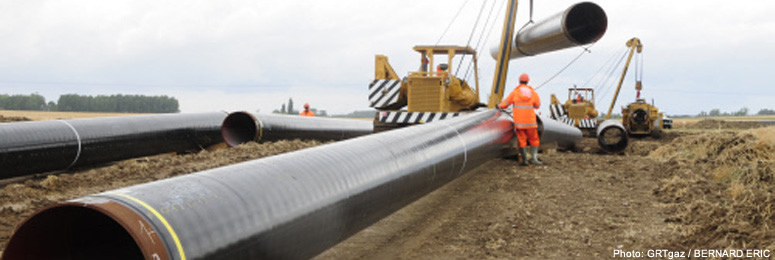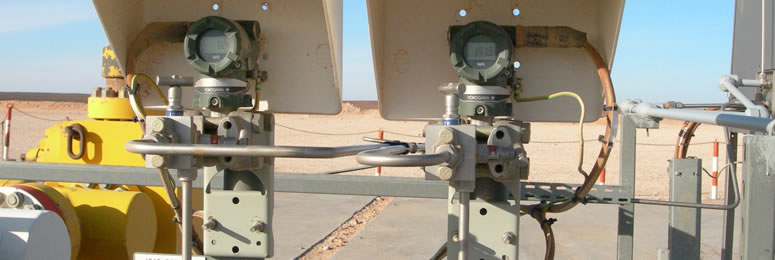News from CCS TLM - April 2012
CCS TLM, together with its parent company Tractebel Engineering, is a provider of integrated, expert consultancy, engineering and advisory services to the emerging CCS sector.
|
|
 INTRODUCTION TO CO2 PIPELINES INTRODUCTION TO CO2 PIPELINES
A primary consideration for any CCS project is that it has given due consideration to the implication on pipeline routing between the capture plant (CO2 source) and the targeted storage site.
Pipeline route selection needs to consider several factors including, but not limited to:
- population locations;
- CO2 dispersion behaviour
- landscape;
- traffic vehicles and vessels;
- ecological aspects and protected areas;
- constructability;
- consentability.

It is important to consider the phase in which CO2 will be transported (gaseous or supercritical) as well as ensuring full dehydration of the entire network. Emission impurities and their effect on pipeline materials as well as potential impacts on the storage reservoir are also important factors to be managed.
Other factors that require careful consideration: - Operability and flow assurance;
- Location of other potential CCS projects and their sinks;
- Political support for the project;
- Public perceptions.
CCS TLM can assist any project sponsor with developing and delivering public outreach programmes to assist with public perceptions and acceptance of CO2 pipelines and/or CCS projects as a whole.
If you have any questions regarding any aspect of CO2 transportation or any aspect of CCS projects, please click here. Lynn Andrews, Head of Transportation and Offshore |
|
 New UK attempt to capture carbon New UK attempt to capture carbon
BBC News
A renewed attempt to develop ways of making power stations greener has been unveiled by the UK government.
For the second time in five years, £1bn will be offered for schemes to trap and bury carbon dioxide. An earlier competition collapsed after all nine entrants pulled out, most citing cost as the main problem. The last to withdraw was a project run by Scottish Power at its Longannet station in Fife, and the prize money was not awarded. Known as "carbon capture and storage" (CCS), the idea is to prevent CO2 escaping into the atmosphere. A major part of the government's low-carbon strategy, CCS has been plagued by delays and uncertainty. Its attraction is that existing fossil fuels including coal and gas can be burned without releasing the usual quantities of CO2, the key greenhouse gas. Instead of being vented into the air, the gas would be trapped and then piped into long-term storage in old oil fields under the North Sea. The original hope was for British firms to design systems that could be fitted to the soaring numbers of coal plants in China and India to reduce their emissions. However, the research has proved costlier and more complicated than many expected, and the timescale keeps slipping.
For the full news article click here.
For full information on the competition from the DECC - OCCS website click here.
|
|
IPAC CO2 Standards
CCSA
Scientists have met in Calgary to complete work on what is being touted as the world's first standard for the underground storage of carbon dioxide.
The Regina-based International Performance Assessment Centre for Geologic Storage of Carbon Dioxide has been working with the Canadian Standards Association on carbon capture rules since 2009.
IPAC-CO2 chief executive Carmen Dybwad says the standard covers what needs to be in place when selecting a site to store carbon dioxide emissions underground.
"It takes a look at all of the risks that might occur at every one of those stages," said Dybwad.
"And when we talk about a risk, it would be a risk that you wouldn't have containment, that somehow the carbon dioxide would get out, that it wouldn't be safe or it wouldn't be permanent."
For the full news article click here. |
|
 CCS TLM ACADEMY TRAINING CCS TLM ACADEMY TRAINING
Our 'Simplifying CCS' open course in Calgary on 9-10th May is fast approaching. Only a few spaces are now available. For full information, click here.
Due to popular request, we have moved and amended our 'Carbon, Capture and Storage: A Field-Based Masterclass' to 4-6 September 2012 in Dorset, UK which is being conducted in conjunction with AGR TRACS Training who provide technical and commercial training courses to the oil and gas industry and Dr Bryan Lovell OBE.
The Field-Based Masterclass in Dorset combines the specialised team from AGR TRACS with the academic excellence of NCCCS and the full value chain experience of the CCS TLM team. The course is unique all-encompassing training experience combining classroom sessions, case studies and field visits.
Delegates will follow the path of carbon from extraction from ancient rocks in the subsurface, through eager use by us, to capture and safe storage back in those same rocks. The course will study the spectacular exposures of rocks and real oilfield facilities and data, set in the demanding financial and legal framework of a World Heritage site. Participants will be supported by tuition in the technical essentials as they work through the logic of a full CCS scheme.
There is an early booking discount of 25% for bookings made prior to 3 June 2012. For full information, click here.
More dates are planned throughout 2012 in various locations. We will keep you updated through this newsletter, alternatively please keep checking our website for more details.
Both courses are undergoing endorsement by the Geological Society and are supported by Dr Bryan Lovell OBE, Senior Research Fellow in Earth Sciences, University of Cambridge.
Fellows of The Geological Society receive a 10% discount on course fees.

To book your place or discuss your individual or bespoke CCS training requirements, please call +44 203 463 8529
or email academy@ccstlm.com.
|
|
|
|
|
Contacts
Paul Bryant
CEO

Sales and Marketing
CCS TLM Academy

Mike Cloud

Capture and Power
Consulting

COO and Eastern Hemisphere

Transportation and
Offshore Consulting

Bryan Lovell
Storage and EOR
Centres of Excellence
CCS TLM Academy

Capture and Power

We provide a comprehensive service covering the entire CCS value chain:
Storage appraisal including EOR
Commercial analysis
Owners engineer &
EPC-M
Contract negotiation
Project integration
Bankability & project finance
Technical appraisal
Risk analysis and assurance
Related Links





|
|